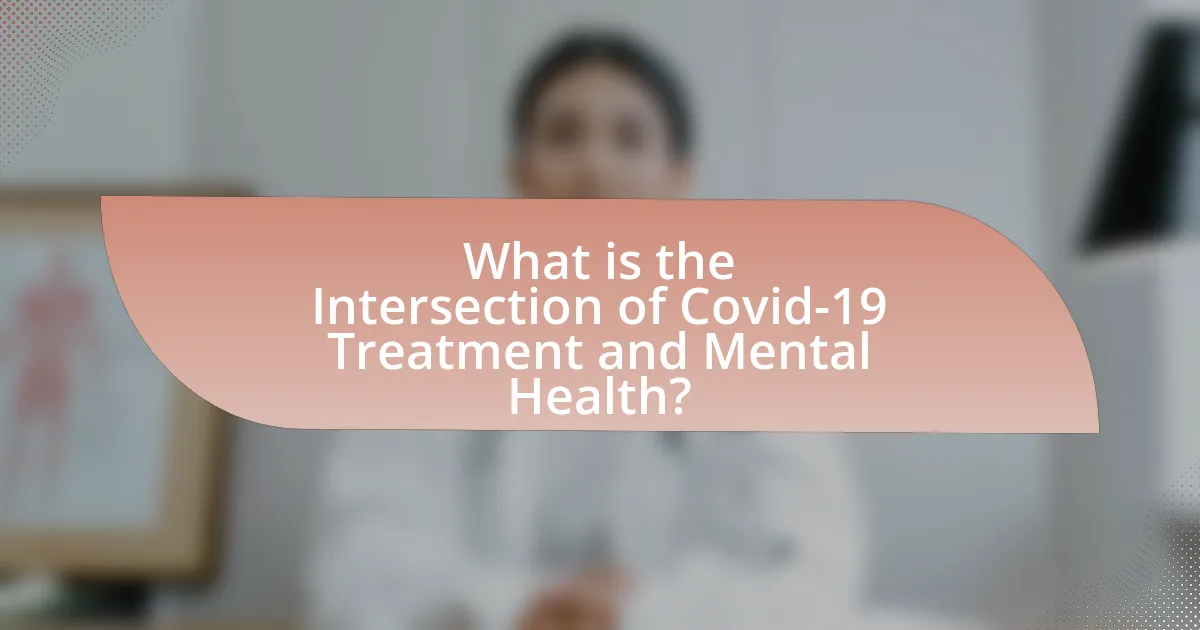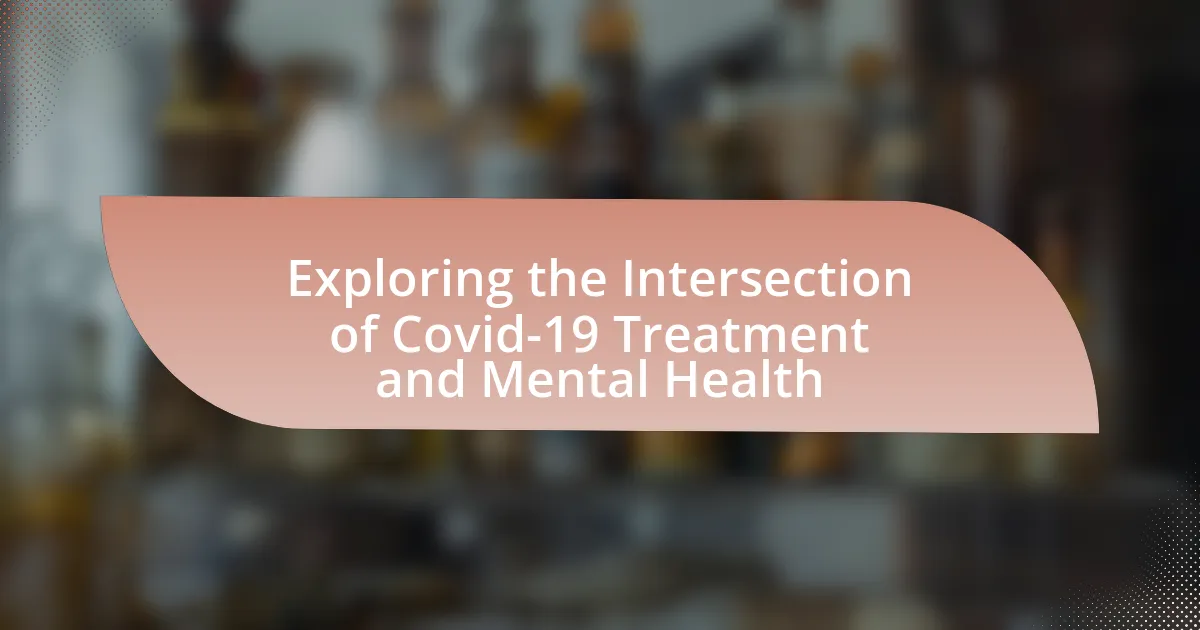The article explores the intersection of Covid-19 treatment and mental health, highlighting the significant psychological impact of the pandemic on individuals recovering from the virus. It discusses the prevalence of mental health issues such as anxiety, depression, and PTSD among Covid-19 patients, emphasizing the necessity for integrated care that addresses both physical and mental health needs. Key treatments for Covid-19, including antiviral medications and supportive care, are examined alongside their effects on mental well-being. The article also outlines strategies for healthcare providers to incorporate mental health support into treatment plans, aiming for holistic care that improves overall patient outcomes.

What is the Intersection of Covid-19 Treatment and Mental Health?
The intersection of Covid-19 treatment and mental health involves the recognition that the pandemic has significantly impacted mental health, necessitating integrated care approaches. Research indicates that individuals recovering from Covid-19 often experience anxiety, depression, and post-traumatic stress disorder, which can complicate their treatment and recovery process. A study published in The Lancet Psychiatry found that 34% of Covid-19 patients reported psychological distress, highlighting the need for mental health support alongside physical treatment. This dual focus on both physical and mental health is essential for comprehensive recovery and improved patient outcomes.
How has Covid-19 impacted mental health globally?
Covid-19 has significantly worsened mental health globally, leading to increased rates of anxiety, depression, and stress-related disorders. A study published in The Lancet in 2021 found that the prevalence of anxiety and depression symptoms increased threefold during the pandemic, affecting millions worldwide. Additionally, the World Health Organization reported that the pandemic has disrupted mental health services in 93% of countries, exacerbating existing mental health issues and creating new challenges for individuals.
What are the common mental health issues arising from the pandemic?
Common mental health issues arising from the pandemic include anxiety, depression, and post-traumatic stress disorder (PTSD). Research indicates that the prevalence of anxiety and depression increased significantly during the pandemic, with studies showing that approximately 31% of adults reported symptoms of anxiety and 24% reported symptoms of depression in 2020, according to the Centers for Disease Control and Prevention (CDC). Additionally, the stress and trauma associated with COVID-19, including loss of loved ones and economic instability, have contributed to heightened levels of PTSD among frontline workers and those directly affected by the virus.
How do social isolation and fear contribute to mental health challenges?
Social isolation and fear significantly contribute to mental health challenges by exacerbating feelings of loneliness and anxiety. Research indicates that prolonged social isolation can lead to increased rates of depression and anxiety disorders, as individuals lack social support and engagement. A study published in the journal “Psychological Medicine” found that individuals experiencing high levels of social isolation during the COVID-19 pandemic reported a 30% increase in depressive symptoms compared to those with regular social interactions. Additionally, fear, particularly related to health concerns during the pandemic, can trigger stress responses that negatively impact mental well-being, leading to heightened anxiety and panic disorders. The combination of these factors creates a detrimental cycle, where isolation intensifies fear, and fear further isolates individuals, ultimately worsening mental health outcomes.
What are the key treatments for Covid-19?
The key treatments for Covid-19 include antiviral medications, corticosteroids, and supportive care. Antiviral medications like remdesivir have been shown to reduce the duration of symptoms and improve recovery rates in hospitalized patients. Corticosteroids, such as dexamethasone, are effective in reducing inflammation and mortality in severe cases. Supportive care, which includes oxygen therapy and mechanical ventilation, is crucial for patients with severe respiratory distress. These treatments are supported by clinical guidelines from organizations like the World Health Organization and the Centers for Disease Control and Prevention, which emphasize their effectiveness in managing Covid-19 symptoms and improving patient outcomes.
What are the primary medical interventions for Covid-19?
The primary medical interventions for Covid-19 include antiviral medications, corticosteroids, and supportive care. Antiviral medications such as remdesivir have been shown to reduce the duration of symptoms and improve recovery rates in hospitalized patients. Corticosteroids, particularly dexamethasone, have been proven to decrease mortality in severe cases by reducing inflammation. Supportive care, which encompasses oxygen therapy and mechanical ventilation, is critical for patients experiencing respiratory distress. These interventions are supported by clinical trials and guidelines from health organizations, demonstrating their effectiveness in managing Covid-19.
How do these treatments affect patients’ mental well-being?
Covid-19 treatments can significantly impact patients’ mental well-being by alleviating symptoms of the virus, which in turn reduces anxiety and depression associated with illness. For instance, studies have shown that effective antiviral treatments lead to quicker recovery times, allowing patients to return to their normal lives sooner, thus improving their mental health. Additionally, the provision of mental health support alongside medical treatment has been linked to better psychological outcomes, as evidenced by research published in the Journal of Affective Disorders, which found that patients receiving comprehensive care reported lower levels of stress and improved emotional resilience.
How do Covid-19 treatments intersect with mental health care?
Covid-19 treatments intersect with mental health care primarily through the psychological impact of the illness and the treatment process. Research indicates that individuals recovering from Covid-19 often experience heightened levels of anxiety, depression, and post-traumatic stress disorder (PTSD), necessitating integrated mental health support alongside physical treatment. For instance, a study published in the Lancet Psychiatry found that 34% of Covid-19 patients reported psychological distress, highlighting the need for mental health interventions during and after medical treatment. Furthermore, the stress of isolation during quarantine and the fear of severe illness can exacerbate pre-existing mental health conditions, making it essential for healthcare providers to adopt a holistic approach that includes mental health assessments and support as part of Covid-19 care protocols.
What role do healthcare providers play in addressing mental health during treatment?
Healthcare providers play a crucial role in addressing mental health during treatment by integrating mental health assessments and support into the overall care plan. They are responsible for identifying mental health issues, providing counseling, and referring patients to mental health specialists when necessary. Research indicates that patients with chronic illnesses, including those affected by Covid-19, often experience increased levels of anxiety and depression, highlighting the importance of healthcare providers in monitoring and addressing these mental health concerns as part of comprehensive treatment.
How can mental health support be integrated into Covid-19 treatment plans?
Mental health support can be integrated into Covid-19 treatment plans by incorporating routine mental health screenings and providing access to psychological services for patients. Research indicates that individuals with Covid-19 experience heightened levels of anxiety, depression, and stress, necessitating mental health interventions alongside physical treatment. For instance, a study published in the Journal of Medical Internet Research found that 34% of Covid-19 patients reported psychological distress, highlighting the need for mental health resources. By including teletherapy options and support groups within treatment protocols, healthcare providers can address the psychological impacts of the virus effectively.
What are the long-term mental health effects of Covid-19 treatment?
The long-term mental health effects of Covid-19 treatment include increased rates of anxiety, depression, and post-traumatic stress disorder (PTSD). Research indicates that individuals who have undergone treatment for Covid-19 often experience lingering psychological symptoms, with studies showing that approximately 30% of patients report significant mental health issues months after recovery. A study published in The Lancet Psychiatry found that Covid-19 survivors are at a higher risk for developing mental health disorders compared to those who did not contract the virus, highlighting the need for ongoing mental health support for these individuals.
How does recovery from Covid-19 influence mental health outcomes?
Recovery from Covid-19 significantly influences mental health outcomes, often leading to increased rates of anxiety, depression, and post-traumatic stress disorder (PTSD). Research indicates that individuals recovering from Covid-19 may experience psychological distress due to the illness’s physical effects, social isolation during recovery, and the uncertainty surrounding long-term health implications. A study published in The Lancet Psychiatry found that 34% of Covid-19 survivors reported psychological symptoms, highlighting the mental health burden associated with recovery. Additionally, the World Health Organization has noted that the pandemic’s impact on mental health is profound, emphasizing the need for mental health support for those recovering from Covid-19.
What strategies can be employed to mitigate long-term mental health issues?
To mitigate long-term mental health issues, individuals can employ strategies such as cognitive-behavioral therapy (CBT), regular physical exercise, and mindfulness practices. Research indicates that CBT effectively reduces symptoms of anxiety and depression, with a meta-analysis showing a significant effect size of 0.88 for its efficacy in treating these conditions. Engaging in regular physical exercise has been linked to improved mood and reduced anxiety, as evidenced by a study published in the Journal of Clinical Psychiatry, which found that exercise can decrease depressive symptoms by up to 30%. Additionally, mindfulness practices, including meditation and yoga, have been shown to enhance emotional regulation and decrease stress, with a systematic review revealing that mindfulness-based interventions can lead to moderate reductions in anxiety and depression symptoms. These strategies collectively contribute to better mental health outcomes and can be particularly beneficial in the context of the mental health challenges exacerbated by the Covid-19 pandemic.
How can individuals manage their mental health during Covid-19 treatment?
Individuals can manage their mental health during Covid-19 treatment by engaging in regular communication with healthcare providers and utilizing mental health resources. Maintaining open dialogue with doctors can help address any psychological concerns related to treatment, while accessing mental health services, such as therapy or support groups, can provide essential emotional support. Research indicates that individuals who actively seek mental health support during medical treatment experience lower levels of anxiety and depression (American Psychological Association, 2020). Additionally, practicing self-care strategies, such as mindfulness, exercise, and maintaining a routine, can further enhance mental well-being during this challenging time.
What coping strategies are effective for patients undergoing treatment?
Effective coping strategies for patients undergoing treatment include cognitive-behavioral therapy (CBT), mindfulness practices, and social support systems. CBT helps patients reframe negative thoughts and develop healthier coping mechanisms, which has been shown to reduce anxiety and depression in clinical settings. Mindfulness practices, such as meditation and deep-breathing exercises, can enhance emotional regulation and decrease stress levels, as evidenced by studies indicating improved mental health outcomes among participants. Additionally, strong social support networks provide emotional and practical assistance, which is crucial for resilience during treatment, with research highlighting that patients with robust support systems report better overall well-being and treatment adherence.
How can support systems be strengthened for those affected?
Support systems can be strengthened for those affected by Covid-19 through the integration of mental health services into healthcare settings. This approach ensures that individuals receive comprehensive care that addresses both physical and psychological needs. Research indicates that individuals recovering from Covid-19 often experience heightened levels of anxiety, depression, and PTSD, necessitating immediate access to mental health resources. For instance, a study published in the Lancet Psychiatry found that 20% of Covid-19 survivors reported mental health issues, highlighting the urgent need for supportive interventions. Additionally, training healthcare providers to recognize and respond to mental health concerns can enhance the effectiveness of support systems, ensuring that patients receive timely and appropriate care.
What best practices can be adopted for holistic care in Covid-19 treatment?
Best practices for holistic care in Covid-19 treatment include integrating physical, emotional, and psychological support. This approach emphasizes the importance of addressing not only the physical symptoms of Covid-19 but also the mental health challenges that arise during the illness. Evidence shows that patients who receive comprehensive care, including mental health support, report better overall outcomes and improved recovery rates. For instance, a study published in the Journal of Medical Internet Research highlighted that mental health interventions, such as counseling and stress management techniques, significantly reduce anxiety and depression in Covid-19 patients. Additionally, fostering social connections through virtual support groups can enhance emotional well-being, further supporting the holistic care model.


